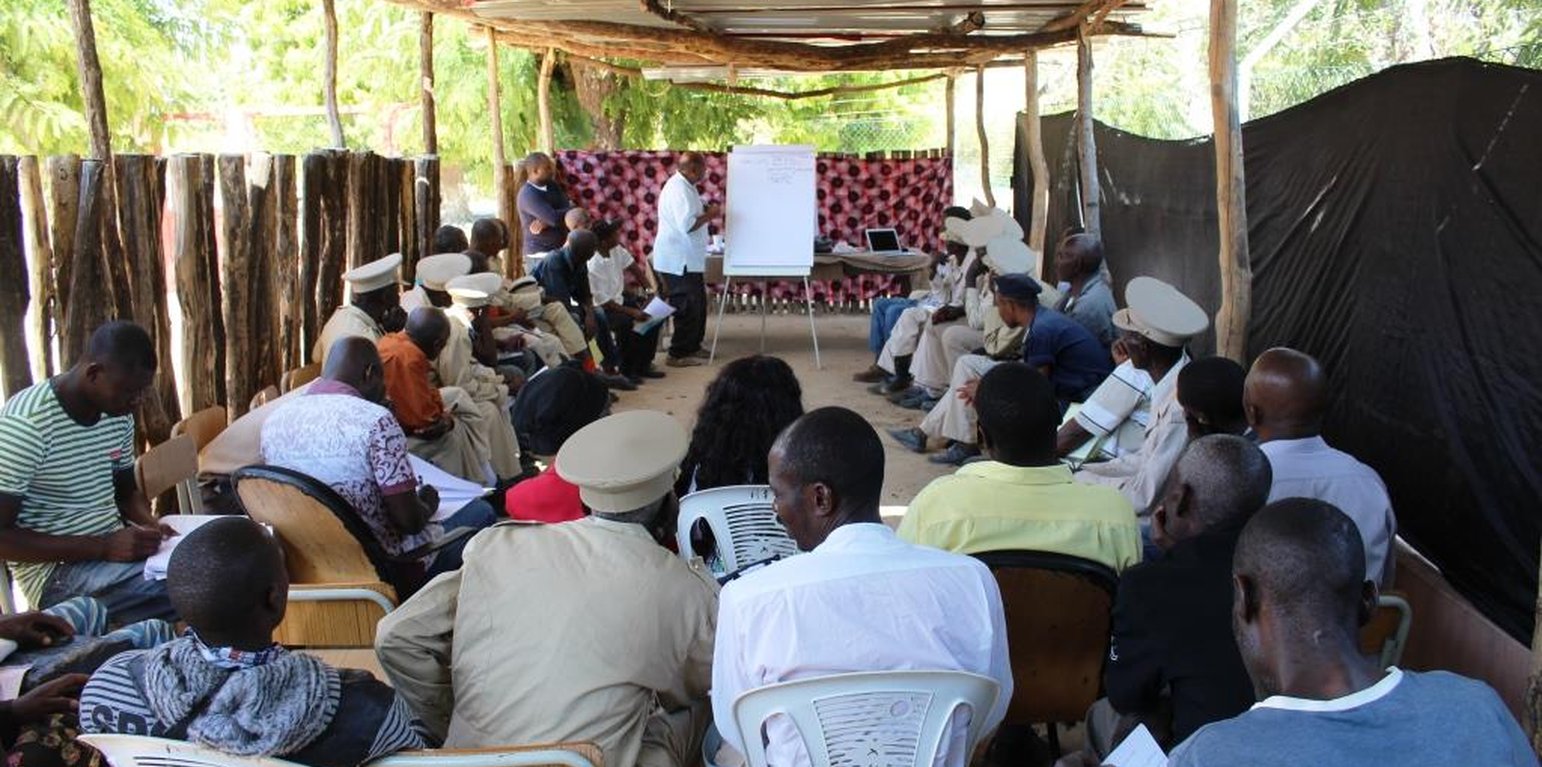Restoration of traditional pastoral management forums
(Angola)
Jangos Pastoris
Descrição
The transhumance pastoral communities of Southern Angola traditionally held gatherings of chieftains and community leaders to discuss management of commonly held pastoral resources. However, the conflicts of the last century led to the breakdown in traditional governance and the majority of the traditional management systems were abandoned. The RETESA Project has supported their recovery as a way to reduce land degradation and improve local livelihoods.
The Approach was developed and implemented through the RETESA Project “Land rehabilitation and rangelands management in smallholder agropastoral production systems in south western Angola”. RETESA is a project owned and implemented by the Ministry of Environment of the Government of Angola with technical and methodological assistance from The Food and Agriculture Organization of the United Nations (FAO), and financed by the Global Environment Facility (GEF).
From an early stage, RETESA identified management itself as the most effective tool to improve pastoral livelihoods and to reduce land degradation over large areas of land. However, the management terms and concepts used in conventional western cultures were difficult to convey to the pastoral communities. Thus communication of the needs and methods of appropriate grazing management were not fully understood and this led to confusion. After struggling initially with these challenges, the project technicians responsible for rangeland improvement and rehabilitation began to investigate the traditional management systems that were in place before the armed conflicts occurred. It was found that they adapted to modern rangeland management theory and practice and had a rich vocabulary which described in detail the timing and movements of the herds. Rather than teach a new way of viewing the natural world, the project's objective became one of resurrecting these lost systems and recuperating what was, in the communities' words, 'the ways of our elders'. In order to provide an underlying methodological basis which guided the process, the “Green Negotiated Territorial Development” (GreeNTD) methodology was introduced and used to negotiate the terms and agreements of the six management plans created and implemented during the process.
In essence, the role of the traditional management systems was to keep the animals in more remote, mountainous areas during the rainy season, the only time of year when water is available in these areas, and gradually bring them back to the lowland, river plains during the dry season. This simple system allowed for rangeland recovery and rest - and for agriculture to be practiced in the lowlands during the rainy season without the threat of intrusion by livestock, something which has become a constant source of conflict within the communities. The periods of 'recovery and rest' of the different areas also meant that important grasses and forage plants could grow, produce seed and multiply, something which was not occurring any longer, where the animals were now free to roam where they wished, returning to the same areas day after day and reducing ground cover to a bare minimum.
The modern discussion forums, or 'Jangos', are still traditional affairs run by traditional authorities and representatives from the communities. But they have adapted to include local Administrations and their technicians, as well as veterinarians, church leaders, NGOs, ranchers and farmers, so as to involve a broader range of stakeholders. The addition of these stakeholders and their involvement and approval of the decisions that come out of the forums are seen as key to the survival and effectiveness of the new management plans implemented.
Localização
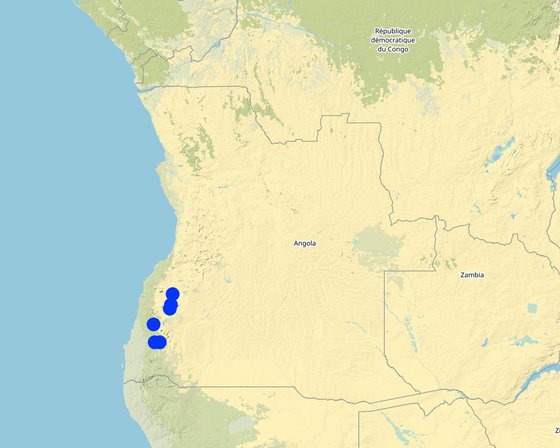
Localização: Municipalities of Bibala, Virei and Quilengues, Province of Namibe and Huila, Angola
Geo-referência de locais selecionados
-
12.94833, -15.72548
-
12.9085, -15.04789
-
13.60459, -14.3042
-
13.6721, -13.89884
-
13.16547, -15.72713
-
13.55423, -14.44119
Data de início: 2015
Ano de término: n.a.
Tipo de abordagem
-
Tradicional/Indígena
-
Iniciativa/inovação local recente
-
Baseado em projeto/programa
-
The approach relies on a combination of Traditional Inputs and the RETESA Project support
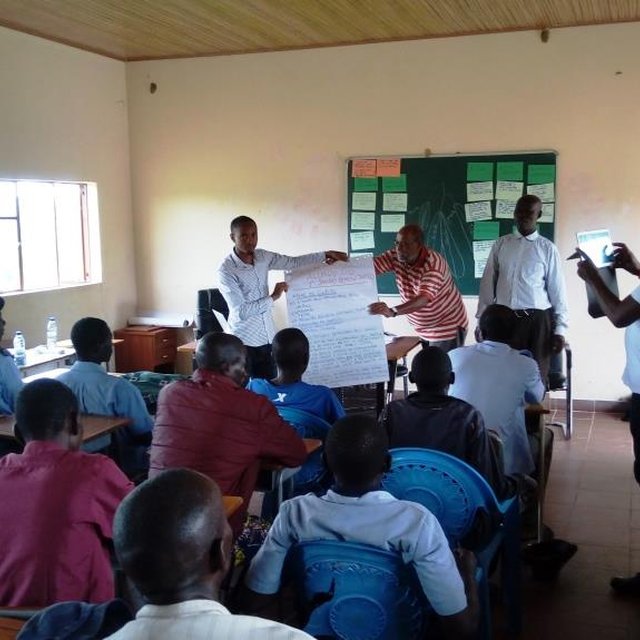
Presentation of the final grazing management plan for the Commune of Impulo (Projecto RETESA 2017)
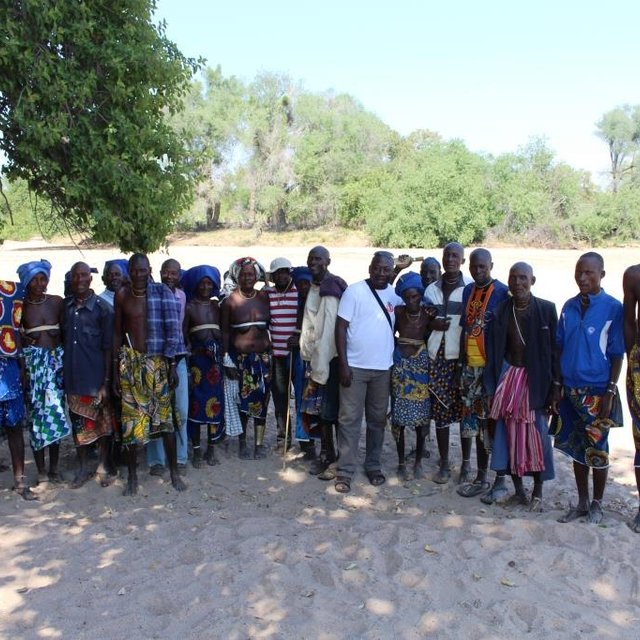
Celebration of a a Jango pastoril in the Community of Cavelocamue, Virei (Projecto RETESA 2017)
Objetivos de aproximação e ambiente propício
Principais metas / objetivos da abordagem
To establish Jango Pastoril as institutions in strategic areas and use GreeNTD methodology to develop and implement six natural resource management plans that address the causes of land degradation, and improve production and local livelihoods.
Condições que permitem a implementação da Tecnologia(s) aplicada(s) sob a Abordagem
-
Normas e valores sociais/culturais/religiosos: There is a clear understanding of the benefits of recuperating the traditional social structures and management systems.
-
Quadro institucional: Most of the Municipal governments and community leaders involved have invested in the approach and wish to continue with the forums.
-
Colaboração/coordenção de atores: The pastoral communities are fully aware of the land degradation and challenges they face, and see the Jango Pastoril forums as a way to address these challenges.
-
Políticas: The RETESA Project has succeeded in presenting traditional livestock management and transhumance movements in a positive light and is working with the Angolan Government to improve policies directed at livestock and herder movement throughout the transhumance migration routes, at community, regional and national levels.
-
Carga de trabalho, disponibilidade de força de trabalho: There is a vast pool of young people able to work.
Condições que dificultam a implementação da Tecnologia(s) aplicada(s) sob a Abordagem
-
Normas e valores sociais/culturais/religiosos: Current cultural norms and socio-political systems hinder the recuperation of the traditional systems as they originally were; therefore, adaptations need to be applied to make them viable under current conditions.
-
Disponibilidade/acesso a recursos e serviços financeiros: The project ends in April 2018, at which point the Jangos must be self-sufficient and self-operating. Given the current economic crisis, this will be a challenge.
-
Quadro institucional: Pastoral, nomadic lifestyles are seen as a threat to education and prosperity by some institutions operating in the country, and the forums could be seen as a way of preserving pastoral culture.
-
Colaboração/coordenção de atores: Communication has improved through the forum structure, though collaboration within communities for common benefit is still on the whole uncommon and could threaten the sustainability of the plans agreed by the forums. Some communities also fear that improvements in land productivity or infrastructure could lead to land being seized by more powerful actors.
-
Quadro jurídico (posse de terra, direitos de uso da terra e da água): Land and water rights were not addressed during the forums and are still unclear in the majority of locations these forums are operating. The land management plans were based on maintaining the 'status quo' currently operating in the area.
-
Políticas: Pastoral cultures are still seen by many in power as a threat to education and economic prosperity.
-
Governança da terra (tomada de decisões, implementação e aplicação): There still remains much to be done in the area of land governance, from decision-making, implementation and especially enforcement.
-
Conhecimento sobre GST, acesso a suporte técnico: Very little is known about SLM, and technical support is lacking at community and municipal levels.
-
Mercados (para comprar entradas, vender produtos) e preços: The more traditional tribes rarely sell their animals to local markets, leading critics to claim that their way of life contributes little to the local or national economies.
-
Carga de trabalho, disponibilidade de força de trabalho: Manual labour is most often carried out by the women of the family, and those under 18 years are responsible for caring for the animals and following them on their daily search for pasture and water.
Participação e papel das partes interessadas envolvidas
Partes interessadas envolvidas na abordagem e seus papéis
| Que partes interessadas/órgãos de implementação estavam envolvidos na abordagem? |
Especifique as partes interessadas |
Descreva o papel das partes interessadas |
| Usuários de terra/comunidades locais |
Originally it was just the community chiefs and respected livestock producers who took part in the Jango Pastoril meetings, though the modern version also includes Administrators and their staff, Administrative technicians, veterinarians, ranchers, church leaders, NGOs and farmers. |
Given that it is the local land users and communities who manage the land on a daily basis, it is their role to fully understand the issues being debated and how the new management plans will affect them. This is usually done through a community Jango Pastoril forum run by the project and traditional leaders who participate in the Municipal Forums, with the support of the local Administrations. In the community Jango Pastoril, the decisions taken at a Muncipal level are presented, opinions are expressed and the plans are modified or agreed upon. Community feedback is then presented by the traditional leaders at the next Municipal Jango Pastoril where it is recorded and taken into consideration, with the necessary adaptations being introduced. |
| Organizações comunitárias |
Agropastoral Farmer Field School (APFS) Facilitators and Members. Representatives from the Agricultural Development Iniciatives. Local Church Representatives. |
The community-based organisations participate in the discussions and speak for those they represent. Many times they are the ones who support the Administrations in the communication or implementation of the decisions made in the forums. |
| Especialistas em GST/ consultor agrícola |
FAO national and international consultants. Administrative agricultural and livestock technicians Veterinarians and Animal Health Workers. |
Provide technical support to discussions and provide feedback on local issues. |
| Organização não governamental |
Local and National NGOs. |
Their role will most likely depend on the objectives of the participant NGO, but often lines of collaboration are easily established. |
| Setor privado |
Representitives from local ranches and private holdings. |
Often the owners are far from the land, and send their local managers to participate, though they have often have little decision-making capacity. However, their presence and opinion should be sought. |
| Governo local |
Municipal and Communal Administrations and their representittives. |
Co-coordinate the organisation and logistics of the Jango Pastoril forums. Participate as a stakeholder in the meetings and give feedback and administrative approval of the decisions taken. The Municipal and Communal Administrations usually have the final word on any decisions made so they must actively participate in the meetings. |
| Organização internacional |
Project 'RETESA', FAO Angola. |
FAO Angola was responsible for supporting the Angolan Government in its design and execution of the Global Environment Funded 'Project RETESA'. |
Agência líder
Project 'RETESA', FAO Angola was the lead agency, though plans are for the Municipal Forums to be self-suficient in 2018.
Envolvimento do usuários de terra/comunidades locais nas diferentes fases da abordagem
Nenhum
Passivo
Apoio externo
Participativo
Automobilização
Iniciação/motivação
The first meetings and forums were organised by the Municipal Administrations and the Retesa Project, picking up from previous attempts at organising discussion forums to manage commonly held natural resources.
Planejamento
Once Jango Pastoril were well established, the decision-making process was transferred to them, with technical support being provided by the SLM specialists and with the Municipal Administrators having final word.
Implementação
The implementation of the decisions made was based on their type and complexity and often depended on input and action from various stakeholders. Where possible, external support in the form of technical knowledge, materials, food, machinery, etc. were organised to support the agreed upon activities and works.
Monitoramento/avaliação
At the current stage, monitoring and evaluation is being carried out by the RETESA Project and the supporting Administrations. In the best case scenario, monitoring and evaluation would be carried out by the Jango Pastoril themselves, though external support would most likely be needed, at least until the process is well understood by the forum participants.
Fluxograma
As the initial processes had different entry points and acted at different administrative levels, a graphic representation of the process can be seen in the flow chart provided. Readers are asked to focus on the entry points and how each situation developed, rather than focus on the specific names of the areas.
The Approach has overseen the creation of five Jango Pastoril, each with their own contexts and stakeholders, which are highlighted in the flow chart in green. By introducing and implementing the GreeNTD methodology, the five Jango Pastoril also debated and approved land management plans with administrative and community support, which in some cases allowed for the creation of large grazing reserves. The sixth and final plan is the combination of the 5 plans into an encompassing plan which serves a large part of the principal transhumance migration route.
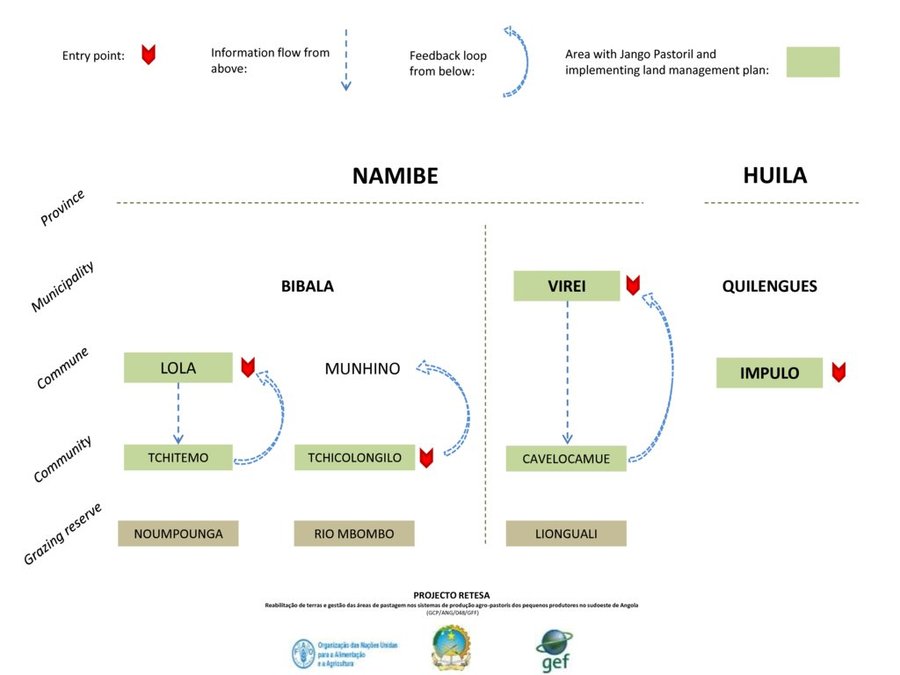
Autor: Projecto RETESA 2018
Tomada de decisão sobre a seleção da Tecnologia GST
As decisões foram tomadas por
-
Somente usuários da terra (iniciativa própria)
-
Principalmente usuários da terra, apoiados por especialistas em GST
-
todos os atores relevantes, como parte de uma abordagem participativa
-
Principalmente especialistas em GST, após consulta com usuários da terra
-
Somente especialistas em GST
-
Políticos/líderes
As decisões foram tomadas com base em
-
Avaliação de conhecimento bem documentado de GST (tomada de decisão baseada em evidências)
-
Resultados de pesquisa
-
Experiência pessoal e opiniões (não documentado)
-
The traditional management system used before the conflicts of the XX century provided important inputs to the final land management plans.
Suporte técnico, reforço das capacidades e gestão do conhecimento
As seguintes atividades ou serviços têm sido parte da abordagem
-
Reforço das capacidades/ formação
-
Serviço de consultoria
-
Fortalecimento da instituição (desenvolvimento organizacional)
-
Monitoramento e avaliação
-
Pesquisa
Reforço das capacidades/formação
Foi fornecido treinamento às seguintes partes interessadas
-
Usuários de terra
-
Equipe de campo/consultores
-
Forum participants
Tipo de formação
-
Em exercício
-
Agricultor para agricultor
-
Áreas de demonstração
-
Reuniões públicas
-
Cursos
Assuntos abordados
Animal health and nutrition; native pasture and rangeland management; water management & illnesses (both human and animal); integrated landscape design and planning; development and governance of Community Management Forums.
Serviço de consultoria
Foi prestado um serviço de consultoria
-
nas áreas dos usuários da terra
-
Em centros permanentes
The Jango Pastoril have limited ability to provide advisory services, but they can be used by participants to find and meet those who can provide assistance.
Fortalecimento institucional
As instituições foram fortalecidas / estabelecidas
-
Não
-
Sim, pouco
-
Sim, moderadamente
-
Sim, significativamente
Descreva instituição, papéis e responsabilidades, membros, etc.
Creation of the Jango Pastoril as an institution in its own right has led to important benefits. Local, communal and municipal institutions have also been strengthened and provided with a direct link to the pastoral communities.
Tipo de apoio
-
Financeiro
-
Reforço das capacidades/ formação
-
Equipamento
Mais detalhes
The Jango Pastoril approach, underpinned by the GreeNTD Methodology, stands as an example of involving local people in decision-making processes around commonly held natural resources. Local and Municipal authorities have benefited by experiencing and overseeing much of the process.
Monitoramento e avaliação
The idea is that the regularly scheduled Jango Pastoril are to act as monitoring bodies for the land management plans, evaluating results and taking action to correct mistakes or adapt to new conditions. However, for the most part it will be the Municipal authorities who decide whether the process is working and whether to continue with them or not.
Financiamento e apoio material externo
Orçamento anual em USD para o componente GST
-
< 2.000
-
2.000-10.000
-
10.000-100.000
-
100.000-1.000.000
-
> 1.000.000
Precise annual budget: 2200.0
It costs about US $500 to organise and fund a Municipal Forum, about US $200 for a Community Forum. Theoretically, there should be around 2 Muncipal Forums and 6 Community Forums per year per Municipality.
Os seguintes serviços ou incentivos foram fornecidos aos usuários de terras
-
Apoio financeiro/material concedido aos usuários da terra
-
Subsídios para insumos específicos
-
Crédito
-
Outros incentivos ou instrumentos
Análise de impactos e declarações finais
Impactos da abordagem
Não
Sim, pouco
Sim, moderadamente
Sim, significativamente
A abordagem concedeu autonomia aos usuários locais de terra, melhorou a participação das partes interessadas?
In most cases, there are no community forums or public spaces for locals to voice their opinions. By creating the Jango Pastoril forums, participant land users and their representatives were able to voice their concerns and propose solutions.
A abordagem propiciou a tomada de decisão baseada em evidências?
Experience in the area has shown that presenting 'scientific evidence' to communities with little formal education can produce interesting interpretations and consequences. Most decisions in pastoral communities are based on past experience, social conventions and emotions. However there is significant collective memory that has allowed for the evidence of land degradation and climate change to become clear and better decisions are being made.
A abordagem auxiliou os usuários da terra a implementar e manter as tecnologias de GST?
Yes, the approach did help land users implement and improve upon current practices. However, the Jango Pastoril forums were not created as a purely educational environment and they depended on the participants having enough experience and knowledge to provide adequate feedback and make proper decisions.
A abordagem melhorou a coordenação e a implementação economicamente eficiente da GST?
Coordination was improved at various public and administrative levels, though the forums as an institution are still in their early stage.
A abordagem mobilizou/melhorou o acesso aos recursos financeiros para implementação da GST?
Funding has been sought for water point improvement works yet none has materialised to date.
A abordagem aprimorou o conhecimento e as capacidades dos usuários da terra para implementar a GST?
As the first Jango Pastoril forums in each area did include 2 hours of education on proper rangeland and natural resource management, some knowledge and capacity building was part of the process.
A abordagem aprimorou o conhecimento e as capacidades de outras partes interessadas?
The exchange of points of view and communication between the different stakeholders improved the collective knowledge of traditional production systems and the challenges each group faces.
A abordagem construiu/fortaleceu instituições, colaboração entre partes interessadas?
The Jango Pastoril forums were the first organised events that brought these different stakeholders to the table to discuss key issues surrounding commonly held natural resources.
A abordagem atenuou conflitos?
The Jango Pastoril discussed and dealt with various sources of conflict in the local areas where they were held. In some cases, solutions were found and agreed upon; however, some conflicts were best left in the hands of the relevant authorities, though suggestions and proposals were gathered and presented to Administrative authorities present.
A abordagem concedeu autonomia aos grupos social e economicamente desfavorecidos?
Pastoral herders often enjoy a certain amount of standing within their communities, and the majority of the participants were elder male members of the communities. Women farmers and widows were often invited but were overall under-represented in the forums. This is clearly an area of improvement for future interventions.
A abordagem melhorou a igualdade de gêneros e concedeu autonomia a mulheres e meninas?
Although a number of women hold high positions within the Provincial and Municipal governments and took part in the forum discussions as administrative representatives, for the most part the participants in the forums were elderly men of standing.
A abordagem encorajou os jovens/as próximas gerações de usuários de terra a se envolverem na GST?
A small percentage of young males took part in the forums. As they mostly care for the livestock, it would be good to improve their participation rates in future events.
A abordagem melhorou as questões de posse de terra/diretos do usuário que inibiam a implementação das tecnologias de GST?
Land rights and tenure were not addressed either by the forums or the Project. The land management plans created and implemented maintained the 'status quo' currently operating in the area.
A abordagem resultou em segurança alimentar aprimorada/nutrição melhorada?
The land management plans should produce improved animal production rates and reduce livestock invasions of crops, leading to improved food security and nutrition.
A abordagem melhorou o acesso aos mercados?
Sales of livestock is still a sensitive issue in the area and this topic did not form part of the discussions.
A abordagem resultou em acesso melhorado à água e ao saneamento?
Water harvesting and access was a common topic and a list of priority areas and works was prepared and presented to Communal and Municipal Administrations, leading to a number of access and storage improvement activities.
A abordagem resultou em uso/fontes de energia mais sustentável?
Charcoal production and its effects on the area was raised and debated a number of times but no agreements or solutions were found.
A abordagem aprimorou a capacidade dos usuários da terra de adaptar-se a mudanças climáticas/extremos e atenuar os desastres relacionados com o clima?
The creation of large-scale grazing reserves and institutions that allow for debate and adaptation of management to increasing changes should lead to an improved capacity to adapt to changes in the climate.
A abordagem resultou em emprego, oportunidades de renda?
Principal motivação dos usuários da terra para implementar a GST
-
Produção aumentada
-
Lucro (lucrabilidade) aumentado, melhora da relação custo-benefício
-
Degradação do solo reduzida
-
Riscos de desastre reduzido
-
Carga de trabalho reduzida
-
Pagamentos/subsídios
-
normas e regulamentos (multas)/aplicação
-
Prestígio, pressão social/coesão social
-
Afiliação a movimento/projeto/grupo/rede
-
Consciência ambiental
-
Costumes e crenças, moral
-
melhoria dos conhecimentos e aptidões de GST
-
Melhoria estética
-
Atenuação de conflitos
Atividades de sustentabilidade de abordagem
Os usuários da terra podem sustentar o que foi implementado através da Abordagem (sem apoio externo)?
Given coordination and willingness, the communities and Administrations have the resources needed to continue on with Approach as it has been, albeit without the technical and logistical support given by the project until this point. In any case, the process has shown to be well accepted.
Conclusões e experiências adquiridas
Pontos fortes: visão do usuário de terra
-
Through the Jango Pastoril, land users now have available an instrument to voice opinions and bring attention to issues affecting pastoral communities and the natural resources they depend on.
-
It brings people in contact with decision-makers and others who play important roles in community affairs.
-
The Jango Pastoril also serve as a source of information, for example, information on water and pasture availability, on livestock theft, on the Administrations point of view on key issues and priorities, on new projects or programmes
Pontos fortes: a visão do/a compilador/a ou de outra pessoa capacitada
-
The Jango Pastoril brings together a diverse and important group of stakeholders who normally wouldn't meet with the objective of addressing rangeland management and livestock issues. In doing so, it brings attention to a number of serious problems affecting the base of local livelihoods and promotes understanding and collaboration between those present and the communities they represent.
-
It is one of the few ways to directly deal with the root cause of land degradation, which in this case is the cause is poor land management. It was management processes which drove the land degradation, and land management should equally be the tool used to address the problems. The land management plans created through the Jango Pastoril hopefully return things to a process by which the land was productive and supported a wide array of life.
-
It creates an institution whose formalities and objectives are easily understood and appropriated by locals. This institution deals with issues that are of a common concern and that should be receiving more attention than they are.
-
The Jango Pastoril and the commonly agreed land management plans they produced add weight to the argument for maintaining the commons for public use and grazing. By entering into agreements and producing management plans that improve local resources, the communities can show unity and argue against those that want to divide and privatise land in the area.
Pontos fracos/desvantagens/riscos: visão do usuário de terracomo superar
-
It can require a lengthy trip and an overnight stay for participants who have to travel from isolated communities.
The Jangos were scheduled at the same time as other key events and meetings, so as to reduce costs and travel. The Municipal and Communal Administrations usually found accommodation for those that had to stay the night.
-
The issues discussed and decisions made will have outcomes that will affect some land users. Obviously, there are those that are benefiting from the current situation and they will try and ensure that things remain as they are.
The GreeNTD methodology discussed earlier has a well-established system for involving all stakeholders, assessing their motivations and publically producing a viable plan that addresses key issues.
-
The withdrawal of logistical and technical support by the RETESA Project will affect the Jango Pastoril forums.
Approach other projects coming into the area and find other funding opportunities to continue to support the growth of the forums.
Pontos fracos/desvantagens/riscos: a visão do/a compilador/a ou de outra pessoa capacitadacomo superar
-
The Jango Pastoril do little to improve the situation of the disadvantaged members of the population, or to improve gender equality. In other words, they perpetuate current cultural power bases.
Explore ways with the Jangos of bringing in more farmers and women into the discussions. Or create 'Jango Campones' which deal with cropping issues and land rights.
-
The Jango Pastoril do little to address land ownership issues or land rights.
It should be the Jango that ask for help on this issue, but the Jango Pastoril have proven to be in favour of the rangelands being open and available for community grazing.
-
Enforcement of laws and regulations is not always easy in such isolated territory.
Establish protocols and systems for dealing with offenders that are known to the local authorities and support all attempts to communicate the plans to land users and invite their feedback.
Referências
Editores
-
David Tarrason
-
Txaran Basterrechea
Revisor
-
Donia Mühlematter
-
Barbara *
-
Rima Mekdaschi Studer
-
Joana Eichenberger
Data da documentação: 8 de Setembro de 2017
Última atualização: 2 de Novembro de 2021
Pessoas capacitadas
-
Nicholas Euan Sharpe (nick@agrolynx.org) - Especialista em GST
-
Txaran Basterrechea (txaranb@yahoo.es) - Especialista em GST
Descrição completa no banco de dados do WOCAT
A documentação foi facilitada por
Instituição
- FAO Angola (FAO Angola) - Angola
Projeto
- Book project: Guidelines to Rangeland Management in Sub-Saharan Africa (Rangeland Management)
- Reabilitação de terras e gestão das áreas de pastagem nos sistemas de produção agro-pastoris dos pequenos produtores no sudoeste de Angola (RETESA)
Links para informação relevante que está disponível online
